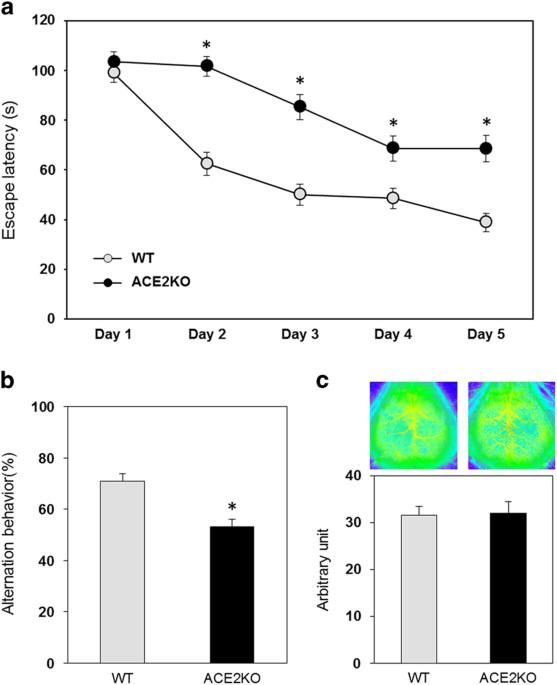Deficiency of angiotensin-converting enzyme 2 causes deterioration of cognitive function
IF 4.1
Q2 GERIATRICS & GERONTOLOGY
引用次数: 50
Abstract
The classical renin–angiotensin system (RAS), known as the angiotensin (Ang)-converting enzyme (ACE)/Ang II/Ang II type 1 (AT1) receptor axis, induces various organ damages including cognitive decline. On the other hand, the ACE2/Ang-(1–7)/Mas receptor axis has been highlighted as exerting antagonistic actions against the classical RAS axis in the cardiovascular system. However, the roles of the ACE2/Ang-(1–7)/Mas axis in cognitive function largely remain to be elucidated, and we therefore examined possible roles of ACE2 in cognitive function. Male, 10-week-old C57BL6 (wild type, WT) mice and ACE2 knockout (KO) mice were subjected to the Morris water maze task and Y maze test to evaluate cognitive function. ACE2KO mice exhibited significant impairment of cognitive function, compared with that in WT mice. Superoxide anion production increased in ACE2KO mice, with increased mRNA levels of NADPH oxidase subunit, p22phox, p40phox, p67phox, and gp91phox in the hippocampus of ACE2KO mice compared with WT mice. The protein level of SOD3 decreased in ACE2KO mice compared with WT mice. The AT1 receptor mRNA level in the hippocampus was higher in ACE2KO mice compared with WT mice. In contrast, the AT2 receptor mRNA level in the hippocampus did not differ between the two strains. Mas receptor mRNA was highly expressed in the hippocampus compared with the cortex. Brain-derived neurotrophic factor (BDNF) mRNA and protein levels were lower in the hippocampus in ACE2KO mice compared with WT mice. Taken together, ACE2 deficiency resulted in impaired cognitive function, probably at least in part because of enhanced oxidative stress and a decrease in BDNF. Angiotensin-converting enzyme 2 (ACE2), an enzyme that regulates a cellular pathway linked to blood pressure regulation, is found to play an important role in maintaining normal cognitive functions. Masatsugu Horiuchi and his colleagues from the medical school of Ehime University in Japan, using classical behavioral tests, compared the cognitive functions of mice without ACE2 with those of normal mice, and found impaired spatial learning and memory in the former. Among the ACE2-deficient mice, the researchers observed an increased production of free radicals and a decrease of an important learning-related nerve growth factor, which might explain their impaired cognitive functions. The study helps elucidate cognitive effects of the protective arm of the hormone system that regulates blood pressure, with potential applications in the prevention of cognitive decline in diseases such as hypertension and diabetes.

缺乏血管紧张素转换酶 2 会导致认知功能退化
经典的肾素-血管紧张素系统(RAS),即血管紧张素(Ang)转换酶(ACE)/Ang II/Ang II 1 型(AT1)受体轴,会诱发包括认知能力下降在内的各种器官损伤。另一方面,ACE2/Ang-(1-7)/Mas 受体轴在心血管系统中对经典的 RAS 轴具有拮抗作用。然而,ACE2/Ang-(1-7)/Mas 轴在认知功能中的作用在很大程度上仍有待阐明,因此我们研究了 ACE2 在认知功能中的可能作用。我们对10周大的雄性C57BL6(野生型,WT)小鼠和ACE2基因敲除(KO)小鼠进行了莫里斯水迷宫任务和Y迷宫测试,以评估其认知功能。与 WT 小鼠相比,ACE2KO 小鼠的认知功能明显受损。与 WT 小鼠相比,ACE2KO 小鼠海马中 NADPH 氧化酶亚基、p22phox、p40phox、p67phox 和 gp91phox 的 mRNA 水平升高。与 WT 小鼠相比,ACE2KO 小鼠海马中的 SOD3 蛋白水平降低。与 WT 小鼠相比,ACE2KO 小鼠海马中的 AT1 受体 mRNA 水平更高。相比之下,两个品系小鼠海马中的 AT2 受体 mRNA 水平没有差异。与大脑皮层相比,Mas 受体 mRNA 在海马中的表达量较高。与 WT 小鼠相比,ACE2KO 小鼠海马的脑源性神经营养因子(BDNF)mRNA 和蛋白质水平较低。综上所述,ACE2 缺乏导致认知功能受损,可能至少部分原因是氧化应激增强和 BDNF 减少。血管紧张素转换酶 2(ACE2)是一种调节与血压调节有关的细胞通路的酶,它在维持正常认知功能方面发挥着重要作用。日本爱媛大学医学院的 Masatsugu Horiuchi 及其同事利用经典行为测试,比较了没有 ACE2 的小鼠和正常小鼠的认知功能,发现前者的空间学习和记忆能力受损。在缺乏 ACE2 的小鼠中,研究人员观察到自由基的产生增加,与学习有关的一种重要神经生长因子减少,这可能是它们认知功能受损的原因。这项研究有助于阐明调节血压的激素系统的保护臂对认知的影响,在预防高血压和糖尿病等疾病的认知功能下降方面具有潜在的应用价值。
本文章由计算机程序翻译,如有差异,请以英文原文为准。
求助全文
约1分钟内获得全文
求助全文

 求助内容:
求助内容: 应助结果提醒方式:
应助结果提醒方式:


